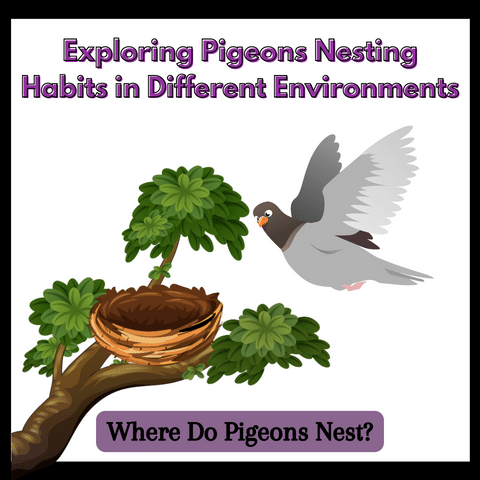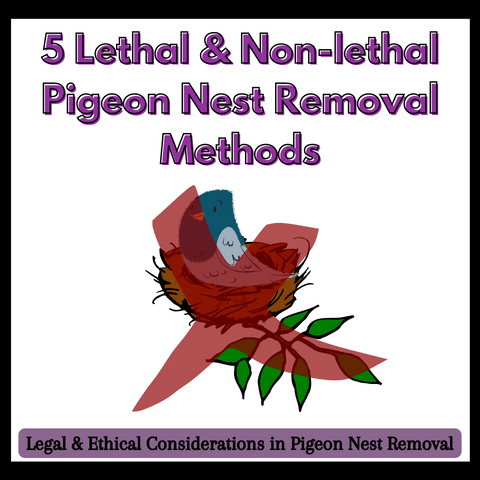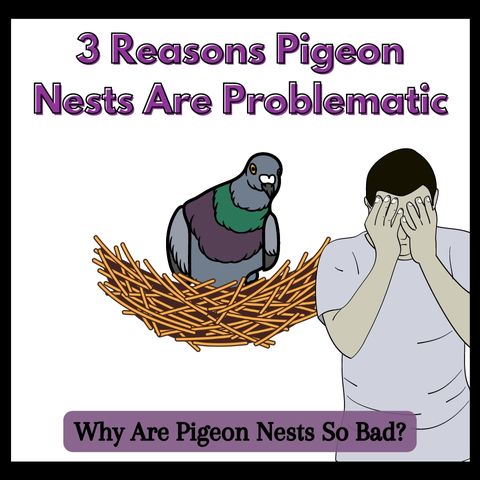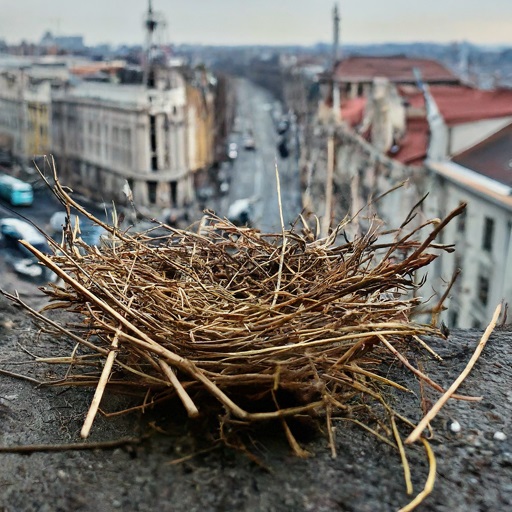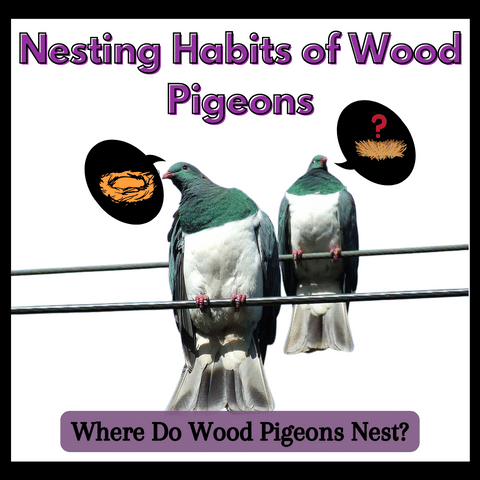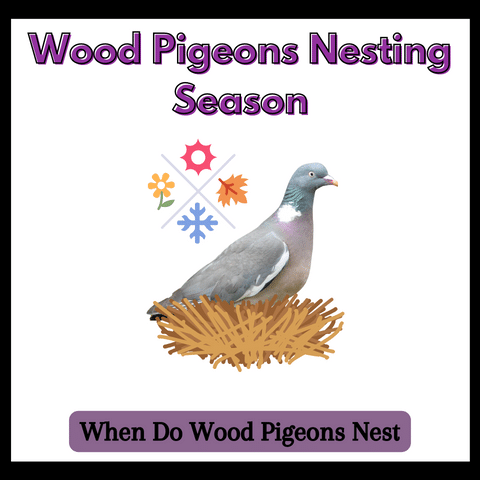How Long Do Pigeons Nest For? (Impact on Homes)
Well, it is common to notice pigeons looking for shelter & nesting spots in urban areas or residential buildings. However, if you want to invite them on your property to build a nest, you might wonder, ‘How long do pigeon nests for.’ In this article, I will discuss ‘How long do pigeons nest for?’ ‘How long do pigeons sit on nests?’ and ‘Are pigeons making a nest in the house good.’
We will also discuss ‘how long a pigeon takes to build a nest.’ Therefore, if you want to explore the duration of pigeon nesting, including how long they sit in their nest and how long it takes to build a nest, read this article thoroughly. But before I tell you the impact of pigeons nesting in the house, let’s first understand how long pigeons nest for.
How Long Do Pigeons Nest For?

Nesting Duration
First, you should note that pigeons nest for a specific period, which may vary based on several factors. On average, you can expect pigeons to nest for about 3-4 weeks. However, this duration also gets influenced by factors like availability of food & water sources, environmental conditions, and nesting site availability. Research studies in urban areas also provide valuable insights into the duration of pigeon nests.
For example, you can find a study conducted in a city park that observed pigeon nests for an extended period & found that the average nesting duration was approximately 25 days. In other studies conducted in residential areas, they documented pigeon nesting for about 28 days on average.
Therefore, the exact nesting duration of a pigeon may depend upon factors like an abundance of food & water resources, favorable weather conditions, and suitable nesting spots, which contribute to longer nesting periods. However, you should note that this scarcity of resources & disturbance in the nesting areas will further lead to shorter nesting durations.
Nest Incubation Period
Pigeons will also incubate their eggs like any other bird species to ensure proper development. You will find both males & females taking turns to set on their eggs & incubate them properly. The incubation period for pigeon eggs tends to be typically around 17-19 days. During this period, pigeons will meticulously keep their eggs warm & protected from potential harm. This kind of shared responsibility of incubation between males & females further helps them to take turns foraging for food & rest.
How Long Does It Take a Pigeon to Build a Nest?

The exact time a pigeon takes to build its nest may vary depending on factors like the availability of suitable nesting materials and the location of the nesting site. On average, pigeons take around 3-5 days to complete their nest construction. If you pay attention to the nesting behavior of pigeons, you will find them exhibiting impressive nest-building skills, using various materials to construct their nest in different locations.
Also, you should note that the nest construction process usually begins with pigeons selecting a suitable spot for their nest, which is often an elevated area like a building or tree branch. After choosing the right spot, they gather materials like grass, twigs, leaves, and feathers to build their nest.
The male will continue to collect the materials & the female will properly arrange them to build the nest effectively. However, you should know that the nest structure’s complexity and the availability of the nesting materials may affect the duration of pigeon building. When we monitored a group of pigeons nesting in an urban area, we found that the average time they took to build a nest was approximately four days.
Is Pigeon Nesting in Houses Good?
Pigeons nesting in homes can have both positive as well as negative implications. Therefore, let’s explore each of the aspects in depth.
3 Benefits of Pigeon Nesting
Surprisingly, pigeons play a crucial role in urban ecosystems & their nesting habits may contribute to overall biodiversity & ecosystem balance. Below, I am mentioning some of the benefits of pigeon nesting that you can witness.
- First of all, pigeons are known to consume various types of fruits, which further helps in dispersing the seeds throughout their dropping, aiding in forest regeneration and plant diversity.
- As our little friends move from one area to another, they may advertently transfer falling and contribute to the pollination of various plants.
- Also, you should note that pigeons serve as a natural food source for many predators like raptors & certain mammals, contributing to the overall ecological balance within urban areas.
3 Challenges of Pigeon Nesting
Even though pigeon nesting can have ecological benefits, there are also many challenges, especially when they choose to nest in residential areas. But before I tell you the three most common challenges of pigeon nests, consider reading my recent article on ‘Why Are Pigeon Nests So Bad.’ Coming back to the point, below are some of the challenges associated with pigeon nesting that you may face in the future:
- Since pigeon droppings are filled with pathogens, they will continue to accumulate over time and can pose health risks to humans. You should avoid inhaling dried pigeon dropping or letting it come in contact with contaminated surfaces, as it may lead to respiratory and health problems.
- Another thing that you might notice is the structural damage. Pigeons may cause damage to buildings by dislodging roof tiles, clogging gutters with nesting materials, and corroding structures with their dropping.
- If the pigeons are nesting near your home, it will create noises & inconvenience due to their droppings, cooing, & potential aggression when protecting their nest.
Suppose you want to manage these kinds of challenges effectively. In that case, I will advise you to take appropriate measures that discourage pigeons from nesting in houses and consider their ecological role. Here is an in-depth article on ‘How To Stop Pigeons Nesting‘ and ‘How to Get Rid of Pigeon Nests‘ if necessary.
Creating a Pigeon-Friendly Environment
First of all* I will advise you to offer alternative food & water resources to force pigeons to be less likely to rely on nesting in houses. Also, you should pay attention to regular cleanliness & maintenance of areas where pigeons tend to nest, like building ledges or balconies. After reading my article on ‘How to Get Rid of Pigeon Nests nests from the balcony, ‘ Pigeons continuously visit your balcony.’ Also, it would help if you considered removing the nesting materials of pigeons along with their dropping to discourage them. Consider installing physical barriers and deterrents like spikes or nets in potential nesting spots to prevent pigeons from assessing these areas.
Minimizing Health Risks Associated with Pigeon Nesting
Wearing protective clothing & gloves will further help you minimize the help associated with pigeon nesting & dropping. Therefore if you are cleaning areas with pigeons dropping, I will advise you to wear clothing like gloves & and a mask to prevent direct contact & inhalation of potentially harmful substances. Also, you should note that proper disposal of pigeon droppings is necessary. Therefore, make sure to follow appropriate guidelines & regulations to dispose of pigeon dropping. Avoid sweeping or blowing it as this may disperse dust particles, further creating health risks for us.
Conclusion
I have given my best to give you in-depth knowledge on the question, ‘How long do pigeons nest for.’ Typically, pigeons are known to nest for an average duration of 3-4 weeks, with an incubation period for eggs lasting 17-19 days. Also, you should note that pigeons may construct their nest using various soft materials & can complete their building process within 3-5 days.
I will encourage you to implement appropriate measures & adopt responsible pigeon management practices to balance appreciating these Birds and mitigating potential issues associated with their nesting habits. If you have any other questions regarding how long pigeons nest for, comment below. Also, check my other helpful guides on pigeon nesting behavior to gain more insight into their intriguing habits. See you in the next post, till then, take care & goodbye.

